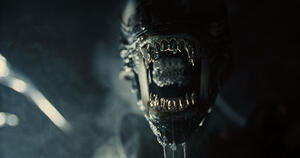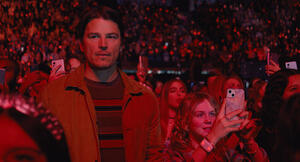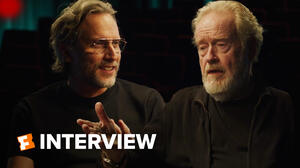
A lot of horror movies try to set the audience on edge by telling them it's "based on a true story," only to then go on and tell a story with chainsaw-wielding cannibals or back-country slashers that is clearly not all that authentic. That's not quite the case with The Witch, one of the most unique horror movies to come along in quite a while.
The Witch never purports to be based on a true story, but it does make the claim that it is inspired by extensive research into family life and folklore in 1630s New England, which is just a few decades prior to the infamous Salem witch trials. It's about a farming family cast out to live on the edge of town. One day their newborn child goes missing, sending shock waves through the deeply religious family as they start to suspect the boy may have been taken by the witch in the woods.
That pitch probably already has you hooked, but if you need a little more information we spoke to writer-director Robert Eggers about the movies that influenced The Witch, what the research process was actually like, and whether or not a remake of Nosferatu is indeed his next movie.
On the movies that influenced The Witch

Robert Eggers: I was really trying to kind of stick to my research and folktales and folklore about witchcraft when constructing the story, but as far as movie influences go, The Shining is just a masterpiece. Certainly, embarrassingly, the movie reeks of The Shining and I’d hardly be successful if that weren’t the case. In my earlier 20s I watched so much to deconstruct it.
Strangely there's also a movie called The Blood on Satan’s Claw. It wasn’t a Hammer movie, but it was one of those English-folklore horrors. I hadn’t even heard of it until we had the money to make The Witch and we were already in Canada getting ready, but that’s a movie that has a lot of similarities and that’s a great film to watch to put this in context, although it didn't directly influence me. Like The Crucible was a thing I was trying to stay away from, but it’s a good movie to watch when focusing on context.
Don’t get me wrong, there’s Crucible-ness in The Witch, but if you look into it, towns in this period almost had the same tropes, like the same things kept happening in them over and over with how the Witch manifests herself amongst people and how it gets you these similar reactions.
Ingmar Bergman was another big influence, Cries and Whispers specifically. But anything Bergman, really. I think the film Häxan, for sure. My witch looks closest to the witch in Häxan.

On creating the witch
Eggers: I always knew that the witch couldn’t be a creature. I always knew she needed to be a human being, albeit a distressed human being. I really wanted to not use makeup aside from making her diseased and filthy and things like that. We were trying to find someone who had the correct physical attributes to look like an accurate witch, as opposed to building one using prosthetics.
I showed the casting directors what I was looking for. One thing really specifically was no teeth, so it had to be someone willing to take out their dentures to play the role. One of the sources that’s not period accurate but is very influential is Francisco Goya, the painter, and Goya’s witches. His witches are kind of outside any period anyway. They’re kind of the best visual representations of witches you could ask for.
The actual research process behind the movie
Eggers: I think because the movie credits the research it seems like I had to have been in some New England town hall with white gloves and parchment paper, but you can find most of my sources on the Internet. Modern academic books were the only thing I used that might be particularly hard to get a hold of. Most of the time the materials that were used for dialogue are things that are fairly easy to access.
As far as getting into really articulating the vision, that got quite specialized. We were having to work with historians and museums and living history experts. We did things like talk to the two people who are experts in Elizabethan and early Stuart farming in England versus what the settlers did over here and how things changed.
Getting the thumbs up for accuracy
Eggers: The historians who were helping out haven’t seen it yet, but there was a screening for a bunch of historians of colonial New England and they gave it a thumbs up for accuracy, and I’d been told they were a particularly tough crowd, so that was rewarding. The crazy thing is the world view of these Puritan settlers was very well represented, which I was most proud of.
On his obsession with the occult
Eggers: Witch mythology, folklore, occult, I’m perhaps more interested in that stuff than film itself. Before even writing this movie, I'd spend most of my time reading that stuff, anyway. I’ve been very interested in reading about the past and witches ever since I was a kid, even though I didn’t know nearly as much as I do now. In most of the work I’ve done in the past and screenplays I wrote that no one wanted to make, they all sort of aligned within that. I wanted to make an archetypal New England horror story, and that was always the goal.
On his reported Nosferatu remake
Eggers: That is definitely not next. That got picked up by the trades really quickly and spread around really quickly. I recognize that it seems a bit megalomaniacal and presumptuous to even remake that, but I love and respect Nosferatu and I’m not going to do anything unless it’s right.
On his actual next movie
Eggers: I’m working on a medieval knight epic right now. I can’t say much.
The Witch is in theaters nationwide February 19, 2015.











